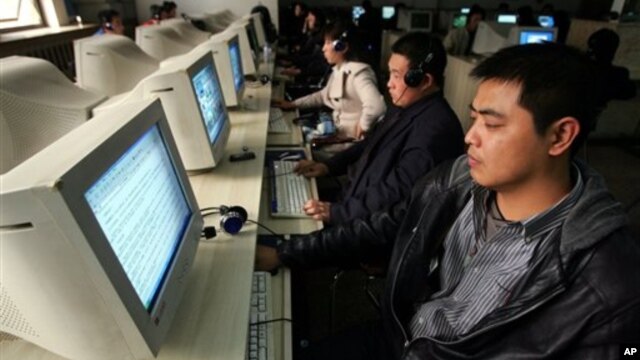Today the free and even common for the whole world Internet is going to be separated on two parts. Experts afraid of the begginig the digital cold war and call for coming to a compromis. But developed countries see a danger of UNO will legalize Internet control. The World Wide Web in this way will be separated into numerous national networks.

There are even an example of such separation ^ China, Saudi Arabia, Iran. In China there is practically no any access to Livejournal, Facebook, YouTube and Twitter. In Iran the YouTube had been blocked since 2009. This happened after mass protests, caused by reelection of Muhammad Ahmandinejada.
Users in Iran do not have access to Facebook and Twitter and also a wide range of popular sites, that are accused of being pornographic or offensive for Islam. It is considered that such sites are threaten national security.
Not so long ago, by the order of Iranian lieder ayatollah Alo Hamenei was formed an In supervision agency - a virtual space Supreme Council. It includes such high officials as a Minister of Information and culture, chiefs of the police and IRGC (Army of the Guardians of the Islamic Revolution). In 2010 IRGC formed a special department to struggle with the “ destructive” nets and several thousand of Iranian citizens who violate the Internet law were arrested.At that time it was created a national Internet, practically wholly independent from the WWW. For example Mehr. It is a site that is going to be the YouTube competitor for Iranian speaing people.
Iranian user found a way to avoid prohibitions with a help of special programmes by imitating the computer location in another country. Of course it is illegal to distribute such a programme in Iran.
The access to such a social networks and news sites is blocked practically in all totalitarian countries, for example in Turkmenistan.
Russia also is speaking about a “logical” Internet regulation/ It was offered to prohibit anonymous registration. The attempts to censor Internet is officially explained as the fight with the terrorism and child pornography. Also it is discussing the amendments into a bill about connections and information, that will allow to block different Net resources.
A Western world also is moving slowly but surely towards the Internet control. In May, 2011 in Dovil was accepted the declaration G8 that supports intellectual property rights (IPR) security measures. Such bill as “ Secure Intellectual Property Rights” or “ Stop Piracy” , that will began the Internet censorship are considering in the USA. The Google creator Sergey Brin is sure that the threat to a free Unternet is coming not only from China and Iran, but also from Apple and Facebook, who by data sharing limits divide Internet among each other.
Maybe soon there will only several zones of a free Internet. The introduction of the approved network censorship under the UNO is a scary tale that can become a true story.
Liked this post? Why not to Subscribe to Hide IP Soft by Email for FREE

There are even an example of such separation ^ China, Saudi Arabia, Iran. In China there is practically no any access to Livejournal, Facebook, YouTube and Twitter. In Iran the YouTube had been blocked since 2009. This happened after mass protests, caused by reelection of Muhammad Ahmandinejada.
Users in Iran do not have access to Facebook and Twitter and also a wide range of popular sites, that are accused of being pornographic or offensive for Islam. It is considered that such sites are threaten national security.
Not so long ago, by the order of Iranian lieder ayatollah Alo Hamenei was formed an In supervision agency - a virtual space Supreme Council. It includes such high officials as a Minister of Information and culture, chiefs of the police and IRGC (Army of the Guardians of the Islamic Revolution). In 2010 IRGC formed a special department to struggle with the “ destructive” nets and several thousand of Iranian citizens who violate the Internet law were arrested.At that time it was created a national Internet, practically wholly independent from the WWW. For example Mehr. It is a site that is going to be the YouTube competitor for Iranian speaing people.
Iranian user found a way to avoid prohibitions with a help of special programmes by imitating the computer location in another country. Of course it is illegal to distribute such a programme in Iran.
The access to such a social networks and news sites is blocked practically in all totalitarian countries, for example in Turkmenistan.
Russia also is speaking about a “logical” Internet regulation/ It was offered to prohibit anonymous registration. The attempts to censor Internet is officially explained as the fight with the terrorism and child pornography. Also it is discussing the amendments into a bill about connections and information, that will allow to block different Net resources.
A Western world also is moving slowly but surely towards the Internet control. In May, 2011 in Dovil was accepted the declaration G8 that supports intellectual property rights (IPR) security measures. Such bill as “ Secure Intellectual Property Rights” or “ Stop Piracy” , that will began the Internet censorship are considering in the USA. The Google creator Sergey Brin is sure that the threat to a free Unternet is coming not only from China and Iran, but also from Apple and Facebook, who by data sharing limits divide Internet among each other.
Maybe soon there will only several zones of a free Internet. The introduction of the approved network censorship under the UNO is a scary tale that can become a true story.
Liked this post? Why not to Subscribe to Hide IP Soft by Email for FREE













